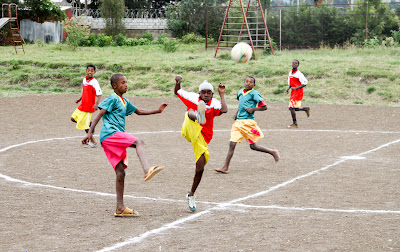 On a government owned plot of land, Sport The Bridge has been able to run their program designed to reintegrate the street boys first with their families and then into school. In the first year of the four year program, the boys come every weekday from 8am-3:30pm. The curriculum is designed to change social behavior through sport and group discussion, with plenty of opportunity to learn discipline and structure. The teachers follow a Swiss developed program called KRAFT Model Programs. Over the course of the program five topics are covered: body, rules, acceptance, fairness, and team. When one topic is completed, the boys are taken to some public institution to further enhance their understanding. For example, after two months of learning about the body, the boys are taken to a hospital to meet doctors and patients.
On a government owned plot of land, Sport The Bridge has been able to run their program designed to reintegrate the street boys first with their families and then into school. In the first year of the four year program, the boys come every weekday from 8am-3:30pm. The curriculum is designed to change social behavior through sport and group discussion, with plenty of opportunity to learn discipline and structure. The teachers follow a Swiss developed program called KRAFT Model Programs. Over the course of the program five topics are covered: body, rules, acceptance, fairness, and team. When one topic is completed, the boys are taken to some public institution to further enhance their understanding. For example, after two months of learning about the body, the boys are taken to a hospital to meet doctors and patients.The boys are integrated back into their families as soon as possible, and the families are encouraged to support the boys in their social and educational development. After the first year, the boys are then integrated into the school system. Sport The Bridge provides uniforms and books, and also follows their school and family progress over the next three years. During this second phase the program is three days a week and the boys are expected to demonstrate the five pillars during sports activities. Of course, everyone’s favorite is football, and we are welcome guests in this respect.
 We arrive to 50 or so boys doing a 15 minute Chi Gong session. It is Friday…football day, and the topic these first year kids have been learning is acceptance. We play a game where half of the boys are weaving through a human circle. At the whistle, the people on the circle close the circle by extending their arms. If a runner is touched by any part of the human circle, he is eliminated and must sit in the middle of the circle. At the first whistle it is apparent that cheating and arguing is not uncommon. And though the discussion afterward elicits some very thoughtful reflections from the boys, it all seems like lip service as we move into the football matches. There are complete meltdowns, whining, crying, screaming at each other; I even have to pry a boys hand off of a teammate’s throat and by the look on his face, the intention is not simply to hurt.
We arrive to 50 or so boys doing a 15 minute Chi Gong session. It is Friday…football day, and the topic these first year kids have been learning is acceptance. We play a game where half of the boys are weaving through a human circle. At the whistle, the people on the circle close the circle by extending their arms. If a runner is touched by any part of the human circle, he is eliminated and must sit in the middle of the circle. At the first whistle it is apparent that cheating and arguing is not uncommon. And though the discussion afterward elicits some very thoughtful reflections from the boys, it all seems like lip service as we move into the football matches. There are complete meltdowns, whining, crying, screaming at each other; I even have to pry a boys hand off of a teammate’s throat and by the look on his face, the intention is not simply to hurt.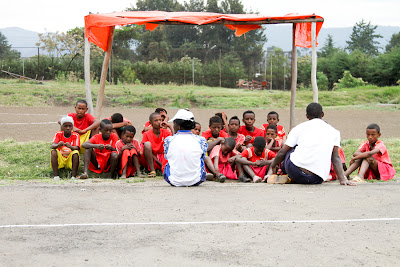 It is naïve to think that rolling a football out to a bunch of street-hardened kids is going to change behavior. Furthermore, this is one environment where the boys can express themselves emotionally. Seeing the boys in complete breakdown mode presents an overwhelmingly uphill battle for Sport The Bridge. There is nothing to prevent them from going back to their street life at any point over the four year program.
It is naïve to think that rolling a football out to a bunch of street-hardened kids is going to change behavior. Furthermore, this is one environment where the boys can express themselves emotionally. Seeing the boys in complete breakdown mode presents an overwhelmingly uphill battle for Sport The Bridge. There is nothing to prevent them from going back to their street life at any point over the four year program.This is Yonas Mindaye’s challenge. He is the Deputy Manager of Sport here and after five years of teaching elementary school, he wanted to work with these boys. “The best thing is giving them love and seeing their changes in school, family, and life.”
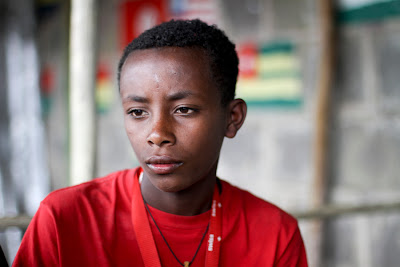 It is difficult to imagine until we talk to the boys about their lives and families. Zirhun Assefa is 15 years old, and the only boy whose compassion towards others visibly stood out. On the street he carried things for people to earn food and shelter money. He was on the street for seven months and joined the program because he wanted to return home but was afraid that his family would not take him back. He now spends every night at home with his aunt and two cousins.
It is difficult to imagine until we talk to the boys about their lives and families. Zirhun Assefa is 15 years old, and the only boy whose compassion towards others visibly stood out. On the street he carried things for people to earn food and shelter money. He was on the street for seven months and joined the program because he wanted to return home but was afraid that his family would not take him back. He now spends every night at home with his aunt and two cousins.When we ask him why he is so caring of the other boys, he says that he doesn’t really realize that he is doing anything special. “I think it is a good thing and I like to keep their morals.” He tells us that he is eager to start school because he wants to be the first in his class.
Zirhun is beyond his years, and like the boys we met in the second phase of the program, football did not elicit any volatile behavior. Clearly a year in the program makes a huge difference. But it takes time, patience, and an occasional ejection.
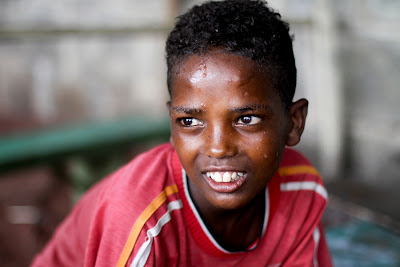 Today Gashaw Gebreyohannes receives his second yellow card of the game for intentionally kicking another boy in the ankle in the game right before lunch (his first was for dissent). Ejected and visibly upset, he throws off his jersey in disgust and storms off to pout alone.
Today Gashaw Gebreyohannes receives his second yellow card of the game for intentionally kicking another boy in the ankle in the game right before lunch (his first was for dissent). Ejected and visibly upset, he throws off his jersey in disgust and storms off to pout alone.All of the boys show considerable respect for Yonas. Even a frustrated Gashaw honors the double yellow. This petit 12-year old boy who heard about Sport The Bridge from some of the older street boys now spends every night at home with his five sisters and one brother. He was selling tissue on the street before, intermittently sleeping at home.
We ask about what he wants for the future he sighs and says, “I want for my mother to make for her a better life. I want to take them away from poverty. I want to be the change maker.”
The silence that follows is all of us taking in Gashaw’s very realistic goal. There are chills and perhaps a little bit of tearing up as we forget about his behavior during today’s match.
Later Gashaw would reflect back on his ejection. “Today’s pillar was acceptance – but I didn’t do it today. I was angry.” And then through a grin he says, “But maybe tomorrow…”
March 19th, 2010
10th of Megabit (7th month), 2002
 Click here or the logo to learn more about Sport - The Bridge
Click here or the logo to learn more about Sport - The Bridge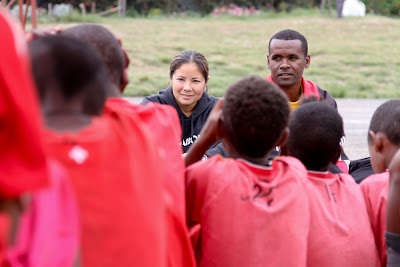
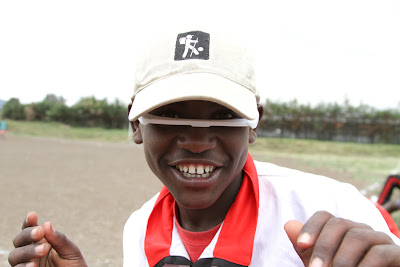








1 comments: on "Sport - The Bridge"
very moving
Post a Comment